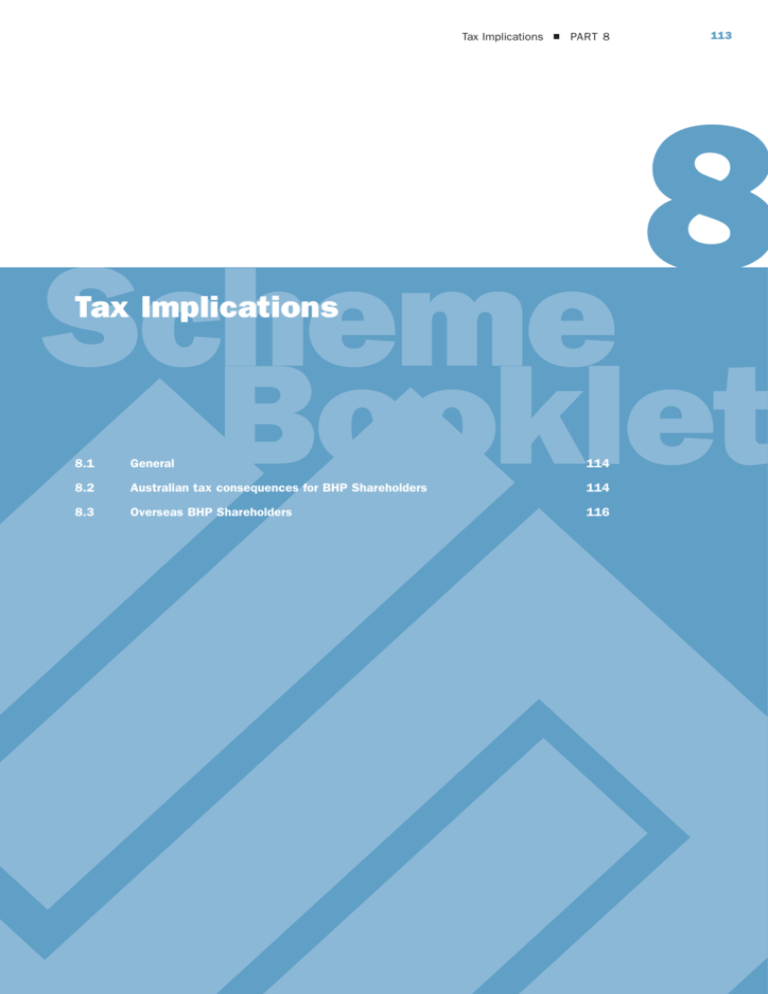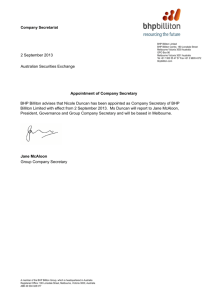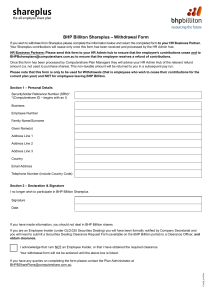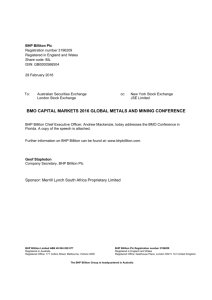Tax Implications
advertisement

Tax Implications PART 8 113 8 Tax Implications 8.1 General 114 8.2 Australian tax consequences for BHP Shareholders 114 8.3 Overseas BHP Shareholders 116 8 114 PART 8 Tax Implications 8.1 General The intention of the following information is to provide a guide to the general tax position of BHP Shareholders in relation to the Spin-out Proposal. It does not purport to be a complete analysis or identification of all potential tax consequences, nor is it intended to replace the need for specialist tax advice in respect of the particular circumstances of individual BHP Shareholders. The information in Part 8.2 is not applicable to all categories of BHP Shareholders and, in particular, does not apply to: • BHP Shareholders who do not hold their BHP Shares as capital assets (for example, BHP Shareholders who hold their BHP Shares as trading stock or revenue assets); • non-resident BHP Shareholders who own (or are deemed to own) less than 10% of the issued shares of BHP; and • BHP Shareholders who are not the beneficial owners of their BHP Shares. All BHP Shareholders, including those whose registered address is outside Australia or who are otherwise not resident in Australia for Australian tax purposes, should consult their tax advisers as to the tax consequences of the Spin-out. Part 8.3 below discusses the taxation consequences for US, United Kingdom and New Zealand resident BHP Shareholders. These jurisdictions have been selected because they are the jurisdictions in which the largest number of BHP Shareholders are located whose registered addresses on the BHP Share Registry are outside Australia. Except as regards the US, the United Kingdom and New Zealand, this Scheme Booklet does not contain discussion of possible taxation implications in foreign jurisdictions of the Spin-out for BHP Shareholders whose registered address is outside Australia. 8.2 Australian tax consequences for BHP Shareholders 8.2.1 Australian resident BHP Shareholders -treatment of return of capital The return of capital by BHP from its share capital account to Fully Paid Shareholders and Partly Paid Shareholders will not be treated (in whole or part) as a dividend for Australian tax purposes. In this regard, BHP, through a representative Australian resident individual BHP Shareholder, has sought and obtained confirmation of the treatment of the return of capital by way of a ruling from the Australian Taxation Office (“ATO”). A copy of this ruling and its supporting explanation is available on request at BHP’s registered office. Those BHP Shareholders who acquired BHP Shares before 20 September 1985 will have no Australian CGT consequences arising on the return of capital from BHP’s share capital account, other than those outlined in Part 8.2.4 below, as these BHP Shares do not fall within the Australian CGT regime. BHP Shareholders who acquired (or are deemed to have acquired) BHP Shares on or after 20 September 1985 will not realise a capital gain or loss in respect of the receipt of the return of capital from the share capital account. In relation to Partly Paid Shareholders, if the Partly Paid Scheme is approved, an interim call will be made and the Reduction Amount will be applied to meet the interim call and should not be taxable. Partly Paid Shareholders will not receive any OneSteel Shares. If the Partly Paid Scheme is not approved, Partly Paid Shareholders will receive the Reduction Amount by cheque. In these circumstances, the difference between the Reduction Amount and the initial call on each Partly Paid Share may be taxable as a capital gain in the hands of Partly Paid Shareholders. 8.2.2 Non-resident BHP Shareholders treatment of return of capital Consistent with the treatment of Australian resident BHP Shareholders, the return of capital by BHP from its share capital account should not be treated (in whole or in part) as a dividend for Australian taxation purposes. For non-resident BHP Shareholders that own (or are deemed to own) 10% or more of the issued shares of BHP, or whose BHP Shares have been used in carrying on a trade or business (wholly or partly) at or through a permanent establishment in Australia, the Australian CGT consequences are the same as for those outlined for Australian resident BHP Shareholders (refer to Part 8.2.1). Non-resident BHP Shareholders that own less than 10% of the issued shares of BHP are prima facie not subject to Australian CGT. Tax Implications 8.2.3 Cost base of Fully Paid Shares For BHP Shareholders who acquired Fully Paid Shares before 20 September 1985, those BHP Shares will not fall within the Australian CGT regime. The concept of “cost base” for those BHP Shares is irrelevant. For BHP Shareholders who acquired (or were deemed to acquire) Fully Paid Shares on or after 20 September 1985, the cost base (indexed up to the September 1999 quarter if appropriate) of those Fully Paid Shares for Australian CGT purposes will change. Generally, it will be reduced by an amount corresponding to the Capital Reduction returned to them by BHP per Fully Paid Share. Accordingly, the cost base of each Fully Paid Share will be the cost base less the Capital Reduction for that Share. For example, if a BHP Shareholder acquired a Fully Paid Share for $14.00 which has an indexed cost base for Australian CGT purposes of $16.00 and receives a return of capital of $0.66 cents per Fully Paid Share from BHP as par t of the Fully Paid Scheme, the BHP Shareholder will not realise a capital gain or capital loss on receipt of the return of capital. The BHP Shareholder will have an adjusted indexed cost base in the Fully Paid Share after implementation of the Fully Paid Scheme of $15.34 If the BHP Shareholder subsequently disposes of their Fully Paid Share, the adjusted cost base (post the return of capital) will be used in the calculation of any Australian CGT liability. The method of calculation will depend on whether or not the Fully Paid Share was acquired before 21 September 1999 and on the nature of the BHP Shareholder (for example company, individual, complying superannuation fund or trust). Where the Fully Paid Share was acquired before 21 September 1999, the BHP Shareholder may chose to index elements of the Fully Paid Share’s cost base up to the September 1999 quarter, at which point indexation has been frozen. Alternatively, the gain may be eligible for the discount capital gain method (refer to Part 8.2.5 for an explanation of this method which is not available for companies). Where the Fully Paid Share was acquired after 21 September 1999 and is disposed of more than 12 months after its acquisition, no indexation is available and only the discount capital gain method may be available. For BHP Shareholders who acquire their Fully Paid Shares by paying the amount owing on their Partly Paid Shares, their cost base will depend on PART 8 115 whether the Partly Paid Scheme is approved. If the Partly Paid Scheme is approved, the cost base of the Fully Paid Shares on payment of the amount owing will equal the issue price of those Partly Paid Shares less the Reduction Amount. If the Partly Paid Scheme is not approved, the cost base for a Partly Paid Shareholder on payment of the amount owing on their Partly Paid Shares will be equal to the issue price of those Partly Paid Shares. 8.2.4 Cost base of OneSteel Shares Regardless, of whether the Fully Paid Shares owned by a BHP Shareholder were acquired before or after 20 September 1985, their OneSteel Shares will fall within the Australian CGT regime. Generally, the cost base for Australian CGT purposes of the OneSteel Shares acquired under the Fully Paid Scheme will be equal to the amount of the return of capital which the BHP Shareholder is treated as receiving under the Fully Paid Scheme which was compulsorily applied to acquire the OneSteel Share, namely $2.64 per OneSteel Share. If a BHP Shareholder were to sell their OneSteel Shares on market at a price greater than the OneSteel acquisition price, the OneSteel Shareholder would realise a capital gain on the amount of the excess. If the price received on the market is less than the OneSteel share acquisition price, the OneSteel Shareholder will realise a capital loss equal to the difference (shortfall). 8.2.5 Calculation of Australian CGT on disposal As all OneSteel Shares will be acquired after 21 September 1999, there will be no indexing of the cost base to adjust for inflation and only the discount capital gain method may be available (as mentioned in Part 8.2.3 above). Where the Fully Paid Shares or OneSteel Shares are held by individuals, complying superannuation entities or trusts for more than 12 months, BHP has received advice that they may be entitled to claim a CGT discount in calculating the amount of the capital gain. For an individual, the CGT discount is worked out as follows: (a) the individual must calculate the capital gain on the difference between the price received on the sale of the shares and the cost base of the shares (no indexation); (b) if the individual has any capital losses they must be used to offset the capital gain; and 8 116 PART 8 Tax Implications (c) of the remaining capital gain (if any), only one half (50% discount) of the capital gain is then included in their assessable income. For complying superannuation entities, the same general methodology as above is used, with the exception that two-thirds (33.3% discount) of the remaining capital gain after the offset of available capital losses (if any) is included in their assessable income. The methodology for trusts is complex and has not been outlined in this Part. Trustees should obtain specific tax advice in this regard. For BHP Shares or OneSteel Shares which are disposed of for a price less than their cost base, the shareholder may incur a capital loss. This capital loss may be available to offset against capital gains in the same year of income or may be carried forward for future years of income. It cannot be used to offset other assessable income. 8.3 Overseas BHP Shareholders 8.3.1 US BHP Shareholders Sullivan & Cromwell, US counsel to BHP, has advised that the Spin-out should qualify as a “tax free spin off” under section 355 of the Internal Revenue Code of 1986, as amended, for tax purposes. If the Spin-out qualifies under Section 355 of the Code, then for US federal income tax purposes no gain or loss will be recognised by (and no amount will be included in the income of) a US Holder (as defined below) on the receipt of OneSteel Shares. If however, the Spin-out does not qualify under Section 355 of the Code, then for US federal income tax purposes a US Holder will be treated as receiving a taxable distribution in amount equal to the fair market value in US dollars of OneSteel Shares received, which will be treated as a taxable dividend to the extent of such holder’s pro rata share of BHP’s current and accumulated earnings and profits (as determined in accordance with US federal income tax principles); any excess will be treated as a non-taxable return of capital to the extent of such holder’s basis in BHP Shares or ADSs and thereafter as capital gain. For this purpose, a “US Holder” is a beneficial owner of Fully Paid Shares or ADSs that is (i) a citizen or resident of the US, (ii) a corporation created or organised in the US or of any political subdivision thereof, (iii) an estate whose income is subject to US federal income tax regardless of its source, or (iv) a trust if a United States court can exercise primary supervision over the trust’s administration and one or more US persons are authorised to control all substantial decisions of the trust. The above referenced advice is based on the Code, its legislative history, existing and proposed regulations under the Code, published rulings and court decisions, all as currently in effect and all of which are subject to change, possibly with retroactive effect. In addition, the advice is based upon certain customary factual representations made by BHP and OneSteel and customary assumptions and may not apply to Fully Paid Shareholders in special situations (such as Fully Paid Shareholders who hold BHP Shares or ADSs, as part of a straddle or conversion transaction). The conclusions set forth above are not binding upon the Internal Revenue Service (the “IRS”) and no ruling has been or will be requested from the IRS concerning the US federal income tax consequences of the Spin-out. The foregoing is only a summary of certain US federal income tax consequences of the Spin-out and is intended for general information only. US Holders are encouraged to consult their own tax advisors as to the US federal, as well as US state and local and non-US, tax consequences to them of the Spin-out in their particular circumstances. 8.3.2 United Kingdom BHP Shareholders Freshfields (Solicitors, United Kingdom) has advised that the Spin-out transactions will probably not satisfy the conditions of section 136 of the United Kingdom Taxation of Chargeable Gains Act 1992 and that they will therefore probably give rise to a chargeable disposal for the purposes of United Kingdom tax on chargeable gains for those BHP Shareholders who are subject to such tax in respect of their BHP Shares. Such BHP Shareholders should seek advice in respect of their own specific circumstances. 8.3.3 New Zealand BHP Shareholders Chapman Tripp (Barristers and Solicitors, New Zealand) has advised that it is likely that the distribution arising from the Spin-out transactions will be treated as a taxable dividend for New Zealand resident BHP shareholders. New Zealand residents should seek advice in respect of their specific circumstances.








